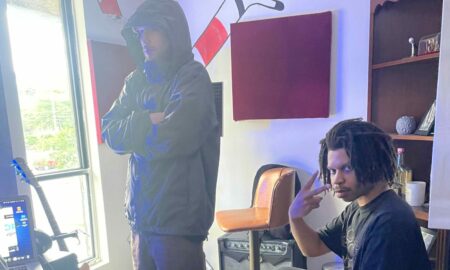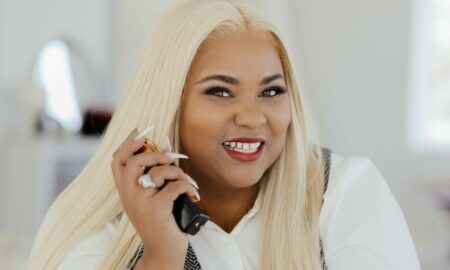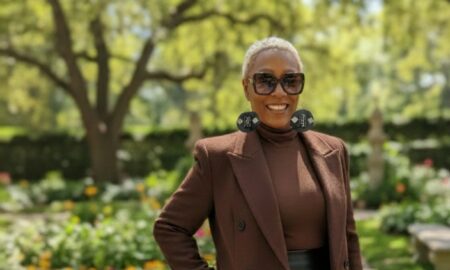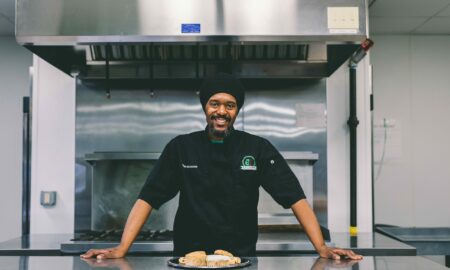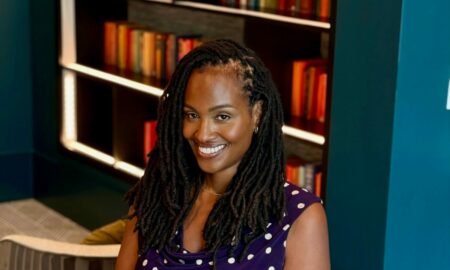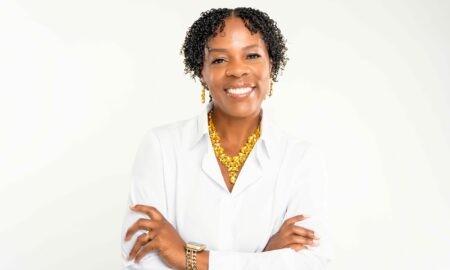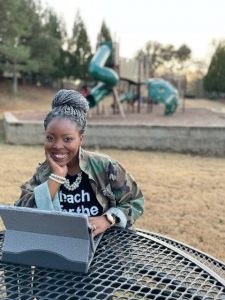
Today we’d like to introduce you to Jamilah Hud-Kirk.
Hi Jamilah, thanks for joining us today. We’d love for you to start by introducing yourself.
Growing up on the southwest side of Detroit and the oldest of five children, I have vivid memories of attending the best elementary schools. These schools, while uniquely different in their approaches, were similar in their impact on my decision to become an educator. The first school, following the tragic, untimely passing of their 14-month old daughter, the founders implemented their sound practices and collective vision of how their remaining three children (and essentially entire generations of Black children like my siblings and I), should be educated. A place where the curriculum was designed to empower children of the African diaspora, coupled with my parent’s home teachings of cultural awareness and identity, would continue to affirm my very existence in the world and foster my Kujichagulia (self-determination) well into my adult years.
The second school, an international school, where the curriculum was designed to teach students from around the world, strived to enrich the diversity represented with the hopes that we would be able to develop an ‘international mind’, adapting quickly to different cultures and posses the ability to empathize and see issues from multiple perspectives. Fast forward to the ’80s, my parents made the tough decision to move us from the place we had known all of our lives as home to what we knew then as our southern home during the summers in Georgia. During a time where it became increasingly more difficult to raise a family, amidst closing factories, increased crime and a movement (Republic of New Africa) that encouraged African Americans to move back to our roots in the south, the instilled cultural awareness, identity of self and the ability to empathize with others in order to see issues from multiple perspectives, would finally be put to the test. It is here where we would come to meet what seemed like cousins on every corner and deepen our relationship with our beloved great-grandmother, who would later live to be 99 years old two weeks shy of her 100th birthday.
The move to Georgia did not come without challenges, however, my previous upbringing and tools that were instilled at an early age would prove to come in handy as I continued my journey to discover myself and who I wanted to become. Twenty-three years later in education (11 as a school principal), three degrees later obtained from my beloved HBCU, Tuskegee University, Auburn University and the University of Texas at Austin and five children later of my own, I have learned and continue to be reminded that my purpose is beyond what I see for myself. Fast forward to the approaching end of my tenth year as an elementary school principal, March 14, 2020. I remember sitting in my office for the rare fifteen minutes that I typically do not get to experience, watching the news of rising COVID-19 cases and wondering how long we would have to experience the closing of school for our children who by definition, were already considered “at-risk” based upon their socio-economic status. What typically would be a time where we are preparing our students for the end of year state assessments, establishing goals for the upcoming school year, a rush to cram in the last unit of instruction before the end of the school year and completion of summative teacher evaluations, was now distracted by a virus that had quickly established its presence and made it clear as to who was in charge of this moment.
I’m sure you wouldn’t say it’s been obstacle free, but so far would you say the journey have been a fairly smooth road?
Leading others is never an easy feat, however, I didn’t become a school leader for the ease, I became a school leader for the impact I wanted to see and for the change I wanted to create. As if leading schools were not already challenging and rewarding at the same time, along came uncertainty. For most leaders, the feeling was surreal and unsettling. If you are leading an organization that was already tackling the challenges of low student attendance, parental involvement and moving students, what started off as leading with grace, quickly shifted to “leading with cultural responsiveness” and leading with balance. While I try to deal with the pressure of keeping a school of 600 plus students and staff safe, hanging over me is the knowledge that many of my students need school to be open or they will fall behind.
As we continued to watch for a glimpse of hope that this quarantine would soon be over, we found ourselves in another unsettling moment. The world as we had known it was disrupting and being replaced with remote learning and a myriad of additional challenges. As the virus numbers continued to rise, the death of George Floyd and others of color shined a bright light on social justice and the role that education plays in inequality and equity. For those of us already in the trenches, this was not a new phenomenon, the world was just beginning to pay attention to something they did not want to face. As a school leader, it is our job to keep everyone safe. You have a sense of responsibility to ensure that even when not in your presence, students and staff are ok. This lack of control can get to you. You suddenly go from being that person that has all of the answers to floundering to put the oxygen mask on first in fear that there will not be enough left for someone else.
How do I serve and teach students who barely have a place to lay their heads, who are struggling with getting adequate food and are missing out on the pre-pandemic Friday bags you were already sending home to ensure there was a meal during the weekends? How was I supposed to help the adults in my school who were experiencing bouts of anxiety and depression as they also attempted to hold it together for their students and families? I found myself tapping into that strength and self-determination I had acquired from my village. The reality was settling in fast. As I found myself between the school and home where I had 3 of my own five children working virtually, from my kitchen table, I found myself running a school of over 600 students, many of whom we were attempting to get online while also attempting to stay connected to my 70 plus faculty and staff. Visiting homes to give out devices, hotspots, school materials and locating children quickly became our new normal. Despite being told we would not return to the building, this wasn’t an option for me as long as my school community was in need of resources and support.
However, despite being introduced to my new normal of challenges, nothing could have prepared me for the new challenge I was about to face. I didn’t learn about this in my former education, mentorship or even in the myriads of educational books and articles previously read over my 23 years of education. Perhaps, the most challenging feat of my career was learning how to lead loss virtually. Supporting staff through trauma and loss and losing one of my own school family members forced me into a place that I so desperately tried to ensure my staff would not go. You see as a school leader, it is your job to make sure everyone else is ok. The loss of a staff member is never easy. I slowly realized that it is tough to hold the space for so much grief in so little time. Within a span of 1 month, we lost a mother, a daughter and a beloved and admired member of our staff. Although I was learning how to navigate my school family through the grief and heartache, I was not doing what I had been advocating since the start of the pandemic. I was not leading with balance.
You see, during the beginning of the pandemic, we all found ourselves for the first time as school leaders on equal playing fields. No one had the answers, no one knew what to expect and we finally needed to rely on each other regardless of our previous experiences. Realizing that I needed a leadership village to lean on, I quickly decided to reach out to school leaders across the country with diverse perspectives, backgrounds and experiences to engage in conversations around navigating through the pandemic, social injustice and leading with balance. These conversations turned into bi-weekly Facebook lives and networking connections that would provide a bit of relief and support to school administrators. With the goal of creating a sense of community and to increase the capacity of school leaders to lead their organizations in this new normal, Principal Captain Kirk evolved beyond posting glimpses of positive school culture in my building to impacting change and mindsets to those who profess to be for students and for those who yearned to become allies. This was my commitment. This was my way of creating the change I wanted to see. Although keeping our schools, a float was important for our communities, which seemed to be evident, was a desperate need to create balance for ourselves.
Thanks – so what else should our readers know about PCK Consulting and Principal Captain Kirk?
In an attempt to create a community where leaders could share their challenges and discoveries about leading during a pandemic, I began to host bi-weekly panels on Facebook Lives. These panels consisted of educational leaders with diverse backgrounds from across the country who shared similar challenges and/or successes with navigating our new normal in education. In addition to creating a community of learners, I began my Principal Captain Kirk blog (Principalcaptainkirk.com), partially to satisfy my desire to create an additional platform that would allow me to share my journey as a principal and my attempt to lead with balance. Throughout my journey, I had the privilege of meeting other amazing women of color who were also leading schools and attempting to define for themselves what their place would be amidst the pandemic and civil unrest.
And because we were learning from each other, another community was formed. Within this community, these leaders, who have not experienced bloggers, or major influencers, were asked to share their learned experiences and resources as well as offer up opinions on current practices as it relates to leadership, faith and work-life balance. This was my attempt to empower other women leaders of color to use their voices to impact change. What I am most proud of and excited to share with other current and aspiring women leaders in 2021 is PCK Consulting LLC. PCK Consulting LLC is an educational leadership consulting group committed to supporting women of diverse backgrounds and with various educational experiences who aspire to elevate their leadership goals to the next level.
A recent study (American Educational Research Association) found that black and female assistant principals are “systematically delayed” and denied promotion to principal, compared to their white or male counterparts, despite having equivalent qualifications and more experience on average. As of 2013, only 20 percent of school administrators were people of color and only 50 percent were women, despite women representing almost 80 percent of teachers. These are just a few of the challenges women in school leadership face. So many leaders are capable of greatness if they just had the right mentorship and support at the right time. PCK Consulting will be dedicated to impacting change in our client’s lives as they receive support through culturally responsive one-to-one coaching, community group coaching and personal growth mentorship.
What would you say have been one of the most important lessons you’ve learned?
I recently heard this quote that would be the message I needed to hear to complete my 2020 year. “In your life, you’ve got to be as good to you as you want to be to God in order to be of service to others in the world.” Iyanla Vanzant. Prior to March 16, 2020, I thought my hardest days were already behind me. Little did I know that my greatest challenge and growth was just ahead. I’d like to think that our experiences this year have given us clarity in our mission and our purpose as educators and as learning communities. I would also like to think that it has given us a renewed purpose for slowing down and truly tapping into what is most important, taking care of ourselves and valuing the time we have left with our family. I recently stumbled upon an old clip of an Oprah Winfrey “Soul Sunday” interview with Author Iyanla Vanzant.
This one clip would soon provide clarity to my leading with balance journey. You see, as school leaders, especially a woman leader of color, we have this innate determination to exemplify what it means to be a strong woman, a strong educator and most importantly, a strong leader every day. We seldom take off our full capes and shields in hopes that whatever is placed in our path, we are ready to tackle while representing the strength we have told ourselves others are expecting from us. Our superwoman defense also encompasses having an intense drive to succeed and feeling an immense obligation to help others, even when detrimental to our own health and well being. So what is so wrong with being a strong leader, a strong mother, a strong woman? Mrs. Vanzant goes on to explain that “when we have the sense of needing to be strong all the time for others, we are “inauthentic” when we always put other people before ourselves.” She goes on to state one of the most profound statements of the interview that has resonated with me ever since. “How you treat yourself is how you treat God, so you are putting God last because you are the representation of God in your life. Which means you are putting other things and people before God.”
This was an eye-opener for me, simply because somewhere along the way, we have learned as principals that we must take care of everyone else in our school communities, which oftentimes place our immediate need for things such as time with self and time with family as secondary to our job needs. Now more than ever, schools need resilient, visionary leaders who are willing to do whatever it takes to keep student learning at the center, even with all of the uncertainty and challenges that the pandemic has presented our schools. However, also more than ever, our lives depend on us to put on the oxygen masks first so that we may show up as our authentic selves in order to be truly effective as leaders, wives, mothers and daughters. My lesson learned for 2020 is to continue to take care of myself and to work on leading with balance so that I may truly be of service to others in the world so that I may honor my purpose.
Contact Info:
- Email: info@pckconsultingllc.com
- Website: Principalcaptainkirk.com
- Instagram: @principalcaptainkirk
- Facebook: https://www.facebook.com/principalcaptainkirk






















